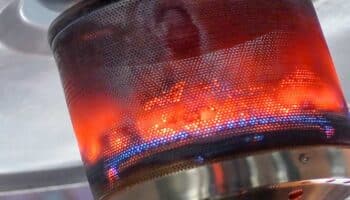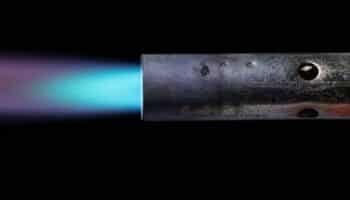We've independently reviewed this article to make sure it's as accurate as we can make it.
To find out more about our article creation and review process, check out our editorial guidelines.
A propane heater which shuts off constantly isn’t much use to anyone.
There’s not much point if you can’t relax without needing to get right back up and fix the heater again. Thankfully, you’re not alone – this is quite a common issue.
If your propane heater keeps shutting off, itIf your propane heater keeps shutting off, it’s important to check the tilt switch and sensors, clean the pilot light and gas line, and try moving the thermocouple.
However, that’s just the short version. Let’s dive into the details below, and I’ll cover what each step does and how best to do it. These tips should mean that you can make sure your propane heater will stay on for good.
Sounds good? Let’s get to work!
Fixing A Propane Heater Shutting Off
#1 Check The Oxygen Sensor
One potential issue is the oxygen sensor – which is a failsafe to make sure the heater isn’t using up all the oxygen in an enclosed space.
You can see more about an Oxygen Depletion Sensor (ODS) here:
If the sensor isn’t faulty, then it’s shutting off the heater because the oxygen in the air surrounding the heater is too low! This obviously isn’t a good thing. As a quick test, try moving the heater to somewhere outdoors (you should never use them indoors anyway) and see if it still turns off.
If it does, you may need to replace the sensor. Thankfully new parts are available online and not too difficult to replace.
#2 Check Your Tilt Switch
If you’re not familiar with what a tilt switch does, let me briefly explain.
Your tilt switch is your propane heater’s ultimate safety mechanism. This part is responsible for sensing when the unit is about to tip over, and cutting off all gas supply at that moment.
As you can imagine, when it works normally, it shouldn’t kick in unless your unit’s about to tip over. However, any malfunction could trick it into thinking that your space heater is about to fall constantly, thus prompting it to shut off randomly.
A lot of people opt for disabling this switch when they start experiencing issues like these. And while this might solve your current situation, I’d strongly advise against it. Your tilt switch is one of the most important safety measures inside your space heater, so please keep it functional.
Solution: Follow the steps from point #1 to access your unit’s internal components and test the tilt switch for continuity.
Assuming the part is, in fact, faulty, don’t worry! In most cases, you should be able to get a replacement from either your nearest hardware store or your manufacturer.
#3 Move Your Thermocouple
A few adjustments could do the trick
What if I told you that your apparent malfunction might just be a positioning issue?
There could be nothing wrong with your propane heater other than the fact that your thermocouple is improperly placed.
This component is responsible for both detecting and regulating your appliance’s internal temperature. When working normally, your propane heater should have no problem staying lit.
However, if your thermocouple is too far from the pilot flame, it could cause the gas supply to be interrupted as a security measure.
This would explain why your unit turns on for a couple of minutes and then shuts off unexpectedly.
Solution: The following instructions apply to propane patio heaters, but the broad strokes should be the same for most models and types:
- Carefully turn off the gas supply, and let the unit cool down completely
- Undo the screws holding the heater’s head to the rest of its body
- Place the head somewhere you can work on it comfortably
- Locate your thermocouple (it should be next to the pilot)
- Look for anything suspicious, and delicately reduce the distance between it, and the pilot
You might have to go through a little trial and error, as the component’s distance will determine its ability to read the unit’s temperature accurately.
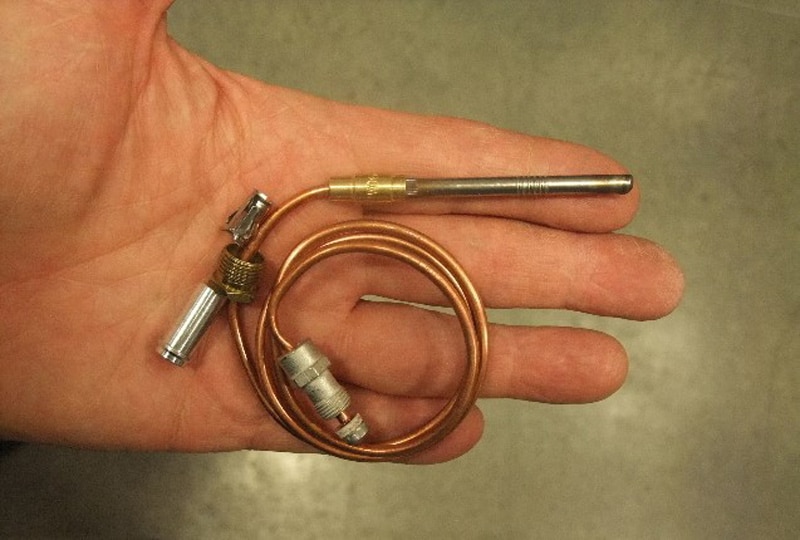
#4 Clean the Pilot
Make sure to keep your components clean
If you’re in the habit of waiting too long between cleaning cycles, there’s a very good chance that your pilot has become excessively dirty.
You might be tempted to think that a component such as this one would not get dirty or become obstructed by debris. But let me tell you, that it’s not only possible, but quite the certainty.
You see, although only propane gas passes through the pilot, over time, some particles in the air can reach the component, and build up around it. When this happens, the free flow of gas through it is significantly compromised.
If your propane heater keeps shutting off, and you’re sure the thermocouple is at the right distance, you’ll want to give this part a much-needed cleaning session.
Solution: Please follow the steps from the previous point to gain comfortable access to your pilot.
Once you can work on it freely, carefully scrub off any dirt or debris that has collected in and around it. Some residue can be hard to remove, but using a little water and vinegar, can soften it up.
This may vary from person to person, but in general, you want to make sure to clean this part at least once every two months.
#5 Replace Your Canister
You might have run out of propane
It’s time to go straight to the source. Let’s check your canister.
Having to constantly replace their canister is one of the things I hear a lot of propane heater owners complain about. It’s inconvenient and annoying but ultimately necessary.
Most propane canisters are designed to last anywhere between 10 and 15 hours of continued gas flow. But even when knowing their lifespan, it can be hard to tell when it’s time for a replacement.
Now, I know what you’re thinking, “Why on Earth would I pay such close attention to my gas canister? I have better things to do”.
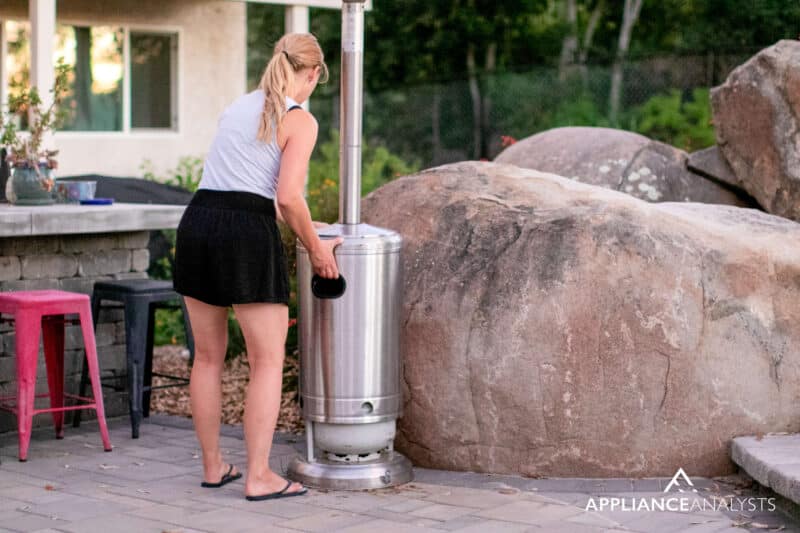
And while I would normally agree with you, this is, sadly, crucial to guaranteeing that your appliance will always work as expected. If your propane heater keeps shutting off, you might be running out of propane, and it’s time to replace the canister.
Solution: If you’ve replaced your canister before, feel free to move on to the next point, but if you haven’t, read on.
Normally, there is a small compartment at the bottom of your heater. Some models use screws to keep it shut, and some others just use a latching mechanism.
Whatever your case may be, make sure to open it carefully.
Once you have comfortable access to the canister, turn the gas valve counterclockwise, unscrew the gas line, remove the old tank, and repeat the process in reverse to place the new one.
This might sound very simple, but if at any point you feel doubtful or unsafe, please do not hesitate to call a technician.
#6 Clean the Gas Line
Debris could be obstructing your gas line
Sadly, your propane heater’s pilot is not the only component that needs regular cleaning.
As time passes, your gas line, which is the hose through which propane flows from your canister to your pilot, can also get dirty, and become obstructed by unwanted buildup.
This is very similar to what happens to our heart’s valves when we eat too much saturated fat.
If the obstruction is total, no gas would flow towards your pilot and your heater simply would not turn on. However, if it’s only partial, propane could flow intermittently towards the flame.
The latter condition is much more dangerous than the former, as it could create dangerous propane leaks, resulting in an eventual explosion.
It is of the utmost importance that, as soon as you suspect this to be the source of the problem, you turn your canister’s gas valve counterclockwise to interrupt gas flow.
Solution: Open your canister’s compartment as if you were about to replace it. Carefully disconnect that end of the gas line from the tank, and do the same for the other end inside your heater.
Once the hose is free, inspect it for any kind of obstruction, and use water to clean it thoroughly.
Doing this at least once every trimester should save you a lot of trouble.
#7 Replace the Gas Line
This one is pretty unlikely, I’ve included it here for completeness but the issue is much more likely to be with the higher-up tips.
Check your gas line for potential leaks
Sometimes, no amount of cleaning will do the trick.
If you’re certain that your gas line is not obstructed or dirty anymore, but you’re still experiencing this problem, there is a good chance that the hose is broken.
The rate at which this happens will depend greatly on how often you use your appliance and whether you relocate it frequently. Gas lines are designed to be sturdy, but not indestructible.
Any kind of tearing across its length could allow for dangerous gas leaks, compromising gas flow to the pilot, and causing the flame to die off randomly.
As you can imagine, this is not only inconvenient, but also extremely concerning. Gas leaks are not only dangerous due to the risk of an explosion, but also due to the risk of intoxication.
Propane gas is dangerous, and breathing it for too long can be life-threatening. This is why, while most commercial gases are odorless, the “popular gas smell” is added artificially later on, as it helps people know when there is a gas leak.
It goes without saying that, if you suspect your gas line to be torn, you should cut off all gas supply from the canister, and inspect the part immediately.
Solution: Assuming that you followed the steps from the previous point, you have already disconnected your gas line. If this is the case, take it to the nearest sink, and fill it with running water.
Look and listen closely for any kind of bubbling or hissing, as these are tell-tale signs of tearing.
Should you determine that the gas line needs replacing, you can easily buy another one from either your nearest hardware store, or your manufacturer.
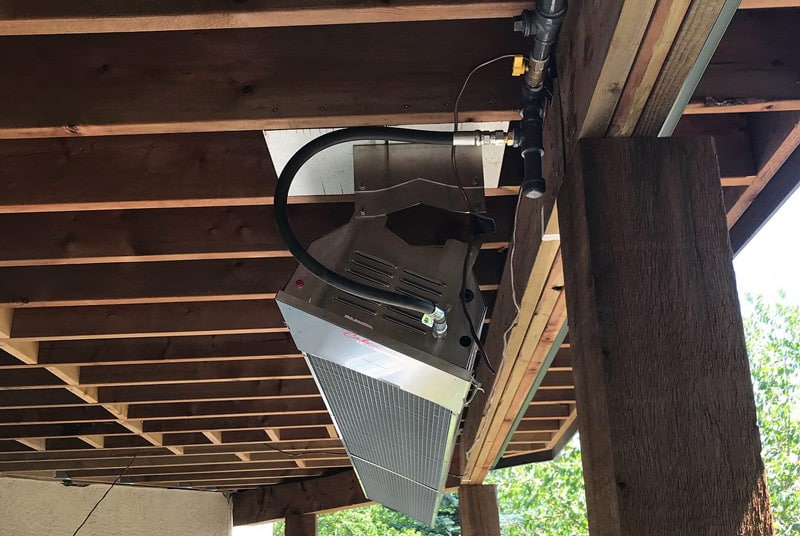
Conclusion
A propane heater that keeps shutting off is like a car that refuses to start. It might look pretty, but for all purposes, it’s useless.
This inconvenience can put you in a very uncomfortable position, as not only do you have to find out what the problem is, but also figure out a way to fix it.
Luckily, as I hope you’ve learned in this piece, addressing most of the causes behind this issue is fairly simple, and should not take up a lot of your time. More often than not, making sure to keep your components clean and replacing a faulty tilt switch, should do the trick.
Thank you for reading. If you found this article helpful, why not become an expert in the subject through our other incredible resources below?





